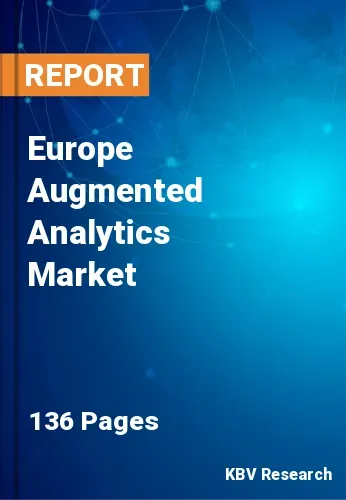The Europe Augmented Analytics Market would witness market growth of 22.1% CAGR during the forecast period (2023-2030).
One of the primary driving factors behind the adoption of augmented analytics is its ability to democratize data analysis. Traditional data analytics often requires a specialized skill set, making it accessible to a limited number of data scientists and analysts. Augmented analytics, on the other hand, empowers business users across departments with the tools and capabilities to perform complex data analysis without extensive technical expertise. This democratization of data analytics is ushering in a new era of data-driven decision-making, enabling a wider range of professionals to leverage data effectively.
Moreover, these tools are transforming how organizations generate reports and dashboards. These solutions provide quicker and more accurate reporting by automating data gathering and analysis, allowing businesses to remain adaptable in a constantly changing business environment. Predictive analytics capabilities enable sales teams to target high-value prospects, while natural language processing (NLP) aids in understanding customer sentiment and feedback. It plays a pivotal role in healthcare by assisting in analyzing patient data, medical records, and clinical research. It enables healthcare professionals to identify trends, optimize treatment plans, and enhance patient care.
As more enterprises are established or expand their operations in Europe, they generate significant data. According to the data from Eurostat, there were 30.1 million businesses in the EU in 2021, which employed 155 million people. 99% (29.9 million) of that total were micro and small businesses. In 2021, the industry sector had 8% (2.4 million) of the total enterprises, generating over one-third of the turnover (€10.4 trillion, 34%). With 23.3 million employees, the 2,31,521 medium-sized businesses (50–249 employees) comprised 0.8% of all businesses. Large businesses employed more than a third of the commercial labor force (56 million, or 36%) despite making up just 0.2% of all businesses. Thus, increasing enterprise numbers and their expansion in European countries and adopting technologies like AI in various industries will boost the demand for augmented analytics in the region.
The Germany region dominated the Europe Augmented Analytics Market, By Country in 2022 and would continue to be a dominant market till 2030; thereby, achieving a market value of $4,396.2 million by 2030. The UK region is exhibiting a CAGR of 21% during (2023 - 2030). Additionally, The France region would experience a CAGR of 23% during (2023 - 2030).
Based on Enterprise Type the market is segmented into Large Enterprises, Small & Medium Enterprises. Based on End User, the market is segmented into BFSI, IT & Telecom, Government, Retail, Healthcare, Manufacturing, Transport & Logistics, Energy & Utility, and Others. Based on countries, the market is segmented into Germany, UK, France, Russia, Spain, Italy, and Rest of Europe.
Free Valuable Insights: The Global Augmented Analytics Market will Hit USD 70.2 Billion by 2030, at a CAGR of 22.3%
The market research report covers the analysis of key stake holders of the market. Key companies profiled in the report include QlikTech International AB, Salesforce Inc., IBM Corporation, Microsoft Corporation, Oracle Corporation, TIBCO Software Inc., SAP SE, SAS Institute Inc., MicroStrategy, Inc. and Alteryx, Inc.
By Enterprise Type
By End User
By Country

Our team of dedicated experts can provide you with attractive expansion opportunities for your business.

